Issue Number 7, Winter 2009-10
Contents
- The Peace of Wild Things by Wendell Berry
- Among the Other Animals by Penelope Schott
- Dragonface Pipefish by Marie-Elizabeth Mali
- Future Wilderness by Kathe Palka
- Greater Flamingo (Phoenicopterus roseus) by Amanda Sandos
- Pictures of the Floating World by Luisa Villani
- River Talk by Marilyn Kallet
- Roadkill Beautiful by Janet Barry
- Rustles in the Underbrush by Irene Hays
- Summer by Nancy Scott
- The Windows by Gary Cooke
- Touring the National Museum in Prague by Crystal Gibbins
Archives: by Issue | by Author Name

The Peace of Wild Things
by Wendell Berry
Wendell lives in the Lower Kentucky Watershed

When despair for the world grows in me
and I wake in the night at the least sound
in fear of what my life and my children’s lives may be,
I go and lie down where the wood drake
rests in his beauty on the water, and the great heron feeds.
I come into the peace of wild things
who do not tax their lives with forethought
of grief. I come into the presence of still water.
And I feel above me the day-blind stars
waiting with their light. For a time
I rest in the grace of the world, and am free.
© Wendell Berry
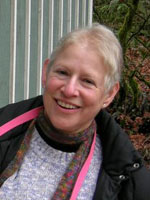
Among the Other Animals
by Penelope Schott
Penelope lives on a ridge which separates the Tualatin River valley from the Willamette River, upstream of where the Willamette joins the Columbia.

Please excuse me as I carry this leg-waving beetle
out to the yard and watch it go.
Surely it values its walking to and fro upon the earth
as I value my own.
Sometimes I envy the salmon who knows how to go
back to the river in which it hatched.
I have been at sea a long time and am sniffing
my way home. This is the estuary
where the test of selfhood is not words or tools
nor any ability to anticipate death.
Nights when I answer the screech owl, music vibrates
the back of my throat,
a language half known: a Spanish speaker almost
understanding Portuguese,
until I become one in the common clan of beasts,
the animal itself, akin to kin.
© Penelope Schott
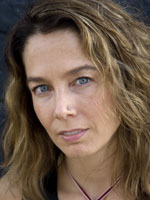
Dragonface Pipefish
by Marie-Elizabeth Mali
Marie-Elizabeth lives on Manhattan schist between the East and Hudson rivers.

Two find each other and begin
their dance, twining and swirling
snake-like, red snouts pointed
at the sky. They twirl vertically
for hours, a slide-and-curl
two-step. As they hover and spin,
the female pats eggs onto the male’s
spotted belly. When they hatch,
the tiny pipes are on their own.
Tell me what creature is too small
to matter, too small to dance out
its wild love in the anonymous sea.
© Marie-Elizabeth Mali

Future Wilderness
by Kathe Palka
Kathe lives in the Raritan Basin on a small bluff overlooking the South Branch of the Raritan River, just west of the confluence, where she occasionally sees bald eagles.

Something there is that doesn't love a wall — Robert Frost
Above Califon, the timeless blue
of a crisp April morning gleams
on the pond at Mountain Farm.
Higher still along the rocky slope,
the trail enters the woods, then travels
down the edge of what my map names
Future Wilderness. I've come to find
this place where the future returns the past.
As the path parallels a farmer's fence,
ruined mounds snake among trees.
The old neighbors, good or otherwise,
are gone, and the cows too.
No one has made a friendly game
of wall-mending in eighty years.
Each freeze and thaw has had its way.
No pines or apples grow, but oaks,
sycamores, beech, maples
and the delicate white dogwoods
have crossed the fallen stones to take back
ground cleared long ago. The woods
are rich again in shadows, riotous
with birdsong and the scurry of animals—
deep in the mischief of spring.
Without our care to wall it out or in,
the land relives itself and the wild returns
from a time before our fathers
ever spoke of fences.
from The Grace of Light, Finishing Line Press New Women’s Voices Series 2004
© Kathe Palka
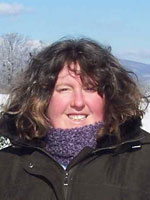
Greater Flamingo (Phoenicopterus roseus)
by Amanda Sandos
Amanda lives on a hundred-acre farm nestled between the Blue Ridge Mountains Peaks of Otter and the James River in the Blackwater Creek watershed.

On the shore of this parched bowl, at the base of a volcano,
ten thousand.
birds flag their heads from side to side, necks stretched,
marching in rows.
Quills on their backs click like the beads of Masai women
walking, barely heard over
the honking chaos. Every year when the rains come, the
lake rises from cracked earth,
they wade through bubbles, mixing blue-green algae and
brine shrimp. If the earth
is quenched they build, scooping and stamping, stamping
and scooping, clapping
their feet, molding mounds, growing thinner, feathers frayed,
caked, matted. She’ll perch
at the top of her turret and sing – soft, lyrical – stretching
towards any who walk past,
resting her neck against the one who stops, hoping he’ll rub
his neck to hers. She’ll close
her eyes and return the caress of the one standing with her
in this boiling lake,
the one who will share their roost, turn their chalky egg, tend their chick, preen and feed,
protect until these waters recede.
This year they waited for the sky to open, but no rains came. Tonight, as the sun sinks,
they lift their wings and fly, without ritual, without young.
© Amanda Sandos
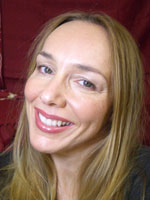
Pictures of the Floating World
by Luisa Villani

– for Julia Butterfly Hill
Ukiyoe I remember to pronounce
by saying, you keep your “a”--
half-a-blessing a girlfriend offered me
in high school, the other half being:
out of trouble. My vulgarities keep me
intact, and ukiyoe is a vulgarity,
a form of painting shunned
by an Asian high court
because it depicted nothing important--trees
mostly, and land, grass, water--things
considered background, landscape.
Imagine then, in the foreground,
the one, who looking up,
saw not the carbon-paper night sky
with its much poked periods of stars
letting in, peephole after peephole
the bone-white light, like death,
behind all things. No. Instead, she saw
the occluding jigsaw of leaf shadows,
the living puzzle, and she said, No
this maze shall not die,
not here, not now. She hugged the hirsute
giant, named her “Luna,” then climbed
away from the sensible ground,
like Cosimo, the much bemused Baron
in an Italo Calvino novel,
who floated above his world,
until he made peace with all things
terrestrial. Julia had no such long-
term plans, no eye on her own
eternity, just on the eternity of a tree,
which she lived in,
for 738 days. Two years
of sleeping like a bent finger,
of the wind pouring by like destiny
twisting every possibility
and every possible branch.
Can I say I’ve gone as far
in that same period of time,
as the woman who sat still
and let trouble find her?
© Luisa Villani
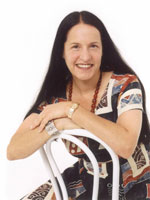
River Talk
by Marilyn Kallet
In the summer, Marilyn teaches for the Virginia Center for the Creative Arts in Auvillar, "Deep France," as they call this region of Gascony, where the Garonne River flows through the village on its way to Spain.

When I let the river answer it babbles
barges, hooks, oars,
undertows.
It surges kings and arms,
Black Death, Jews, witches,
poison, smell of burning,
confides: heroes,
collaborators, pyres.
When I let the river answer it
obsesses about the
nuclear plant upstream.
Rivers speak to other rivers.
When the earth trembles
even rivulets feel it
in their crevasses.
When the fish sicken,
the river can’t get up and leave.
The saules along the bank weep.
Turtledoves toot like tugboats
from children’s books,
the river is never fooled.
The Garonne is stubborn,
flows despite pizza vans and dumps,
despite bridges and Peugots racing overhead.
It looks up at the white sky
and reflects, mouths
slick rocks, lightning and shifting
banks, fish skeletons,
drowned boys, drought, dust,
softened earth,
grass waving bye! like Sampson’s locks.
© Marilyn Kallet
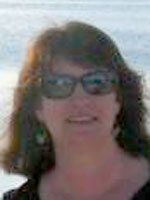
Roadkill Beautiful
by Janet Barry
Janet lives in the foothills of the New Hampshire White Mountains, surrounded by the very active watershed of the Piscataqua River.

as is the turkey,
wildly waving to each car passing, each truck,
she performs her salute, she raises her
wind-worn wings, plumed and gorgeous
in afternoon sun, iridescence gleaming along
her fine long neck, soft along the breast, feathers turn
tawny brown tail to russet red, ooze
as the crows begin their feast, and beautiful,
as is the porcupine, raised this morning by Spring’s strong pull,
meeting dawn with hunger, rolled, rests, sharp with claws curled under,
barbs black and white, military lined, now protecting
only his road-ground bones still beautiful,
as is the fox, the squirrel, partridge, chipmunk,
the deer must have leapt four lanes to meet chain link, her eyes
open, she gazes at blue sky and the bend
of backbone explains why she paused in crumpled
flight, her slender legs, dark hooves,
her head so fine boned and beautiful,
as is the raccoon, the sparrow,
snake, turtle, skunk, salamander, beautiful
as is the turkey,
wildly waving
to each car passing.
© Janet Barry
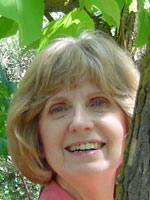
Rustles in the Underbrush
by Irene Hays
Irene lives in the semi-arid shrub steppe near the confluence of the Columbia and Yakima Rivers in southeastern Washington State.

Pygmy rabbit
the smallest of its species
might fit inside a wren’s nest.
Sagebrush lizard
scruffs his way along,
blue belly to the sand.
Burrowing owl
at home underground
measures only a hand-span.
Barely heard
seen only out of the corner of your eye
soon not at all.
© Irene Hays
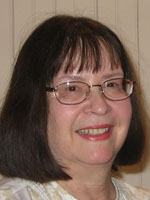
Summer
by Nancy Scott
Nancy lives adjacent to extensive marshland in the Delaware Watershed.

An elderly woman
sits alone on a bench at the bus stop,
waiting for something, maybe the 609,
maybe her dead husband.
We all wait for the sun.
Incessant rain has sent small stones
and dirt clods tumbling down
the embankment in my backyard.
I can feel my house inch
closer to extinction.
Last summer, people complained
about drought, stunted corn,
impassable spots in the river.
Dry needles flared across acres.
We longed to hear rain beating on the roof.
Everywhere there is excess.
No hope to change the progress of the wind.
It will blow away the clouds or won’t.
I am stitching squares
for my granddaughter’s quilt.
First published in Down to the Quick (Plain View Press, 2007)>
© Nancy Scott
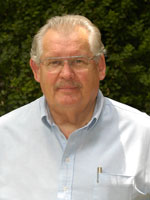
The Windows
by Gary Cooke
Gary lives at the edge of the Texas Hill Country in the Lower Colorado-Cummins Watershed near Gilleland Creek.

What if the windows
in all the hotels in Reno
are really the eyes of wolves,
dead from guns or bad winters,
and their tails are the winds
that sweep across the valley?
And every time a woman gets kissed,
the wolves are licking their lips?
What if great jaws snap and drool
when a woman flips her hair,
or a man drops his cigarette
and turns away?
What if all these eyes are waiting
for one wolf to move,
his huge paws spreading
as he trots in closing circles,
and night howls in aching sadness
the way every train sounds,
winding down the mountain
and hauling toward the city,
the red neon pulsing,
the lights burning all the windows bright?
Originally published in Yuba Flows (Hip Pocket Press, 2007)
© Gary Cooke
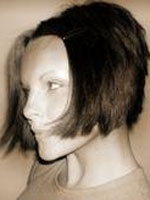
Touring the National Museum in Prague
by Crystal Gibbins
Crystal lives along the US/Canadian border in the Lake of the Woods watershed.

They have waited a long time
for someone to notice them:
these mud grenades,
oatmeal colored and acrid
like a sulfur mine
sitting along drab shelves
behind a wall of glass,
hematite poised and graven,
quartz spiney as a blowfish,
garnet voluptuous like plums
in a bread pudding.
From the window, sunlight
corrugates the room
as if it can transmute into gold
any metal, making me believe
I can create a life from riddles
piled up by glaciers, black
obsidian from the veins
of magma, submerged, slipping
through gaping fissures,
racing toward hardness.
How far they’ve traveled
to get here. Someone
plucked them out of darkness,
brushed the soil clear
from their crumpled faces,
loved them once.
Reprinted from Yellow Medicine Review, Issue 6
© Crystal Gibbins